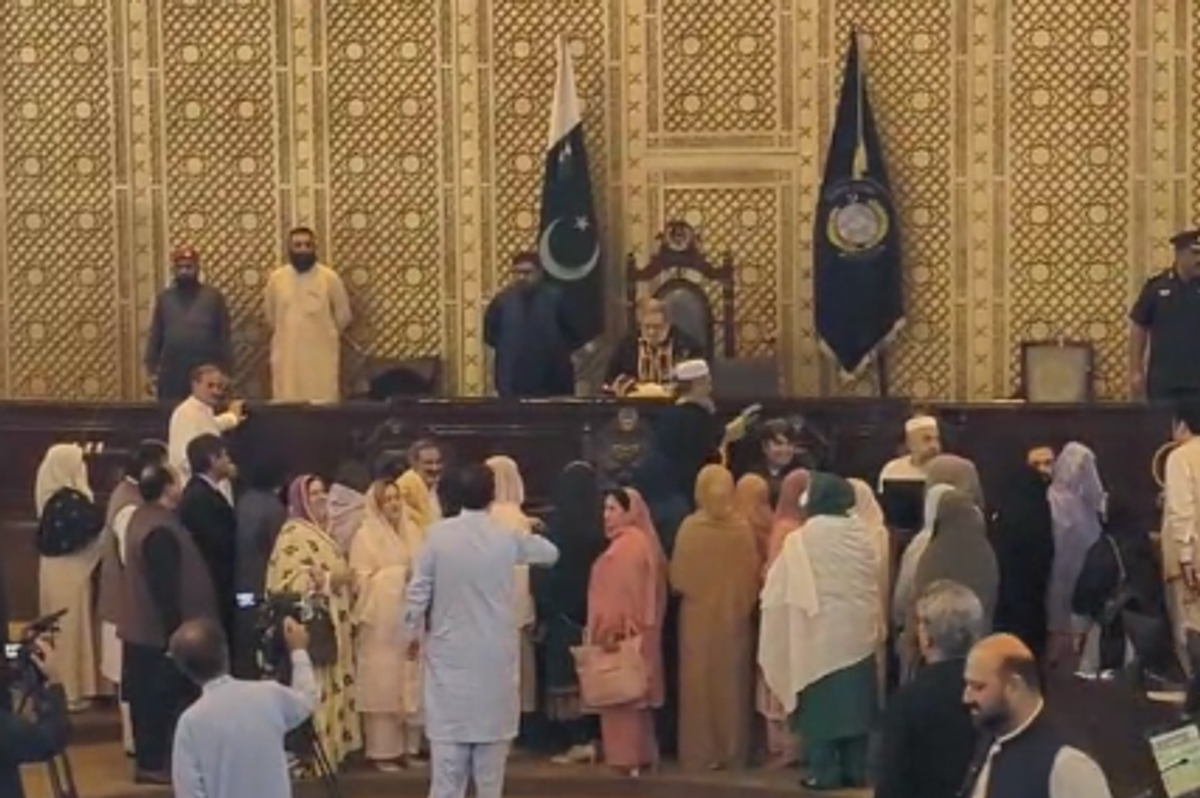Pakistan court steps in after provincial assembly fails to swear in lawmakers
Khyber Pakhtunkhwa governor administers oaths after assembly session adjourned over lack of quorum
Kamran Ali
Correspondent Nukta
Kamran Ali, a seasoned journalist from Khyber Pakhtunkhwa, Pakistan, has a decade of experience covering terrorism, human rights, politics, economy, climate change, culture, and sports. With an MS in Media Studies, he has worked across print, radio, TV, and digital media, producing investigative reports and co-hosting shows that highlight critical issues.

The opposition staged a protest inside the assembly hall, surrounding the speaker’s dais and chanting slogans.
Screengrab
A Pakistani court has stepped in to resolve a political deadlock in the country’s northwestern province of Khyber Pakhtunkhwa, after the provincial legislature failed to swear in a group of lawmakers elected to reserved seats for women and minorities.
The Chief Justice of the Peshawar High Court Syed Muhammad Atique Shah on Sunday nominated Governor Faisal Karim Kundi to administer the oath to the lawmakers, after the provincial assembly speaker abruptly adjourned a special session without completing the process. The move came just one day before Pakistan’s Senate elections, in which these lawmakers would be eligible to vote if sworn in.
The crisis stems from a prolonged dispute over the allocation of reserved seats in the Khyber Pakhtunkhwa Assembly.
Reserved seats are a constitutional mechanism meant to ensure representation for women, religious minorities, and other underrepresented groups. These seats are allocated to political parties in proportion to their performance in general elections.
More than a year after provincial elections were held, lawmakers selected for these seats had yet to take their oaths, despite being officially recognized by Election Commission of Pakistan weeks ago.
KP assembly session rescheduled
On Sunday, a special assembly session was convened to swear them in. But Speaker Babar Saleem Swati adjourned the session, citing a lack of quorum. Before doing so, he ordered a headcount and rang the chamber bells to summon members for a five-minute recess. When enough lawmakers still failed to appear, the session was called off and rescheduled for July 24.
The opposition accused the speaker and the ruling party of deliberately sabotaging the session to prevent newly appointed members from voting in Monday’s Senate elections. Dr Ibad, the opposition leader in the provincial legislature, called the session “a pre-planned drama” and demanded judicial intervention.
Following the adjournment, the Election Commission of Pakistan formally requested the Chief Justice of the Peshawar High Court to nominate an official to oversee the oath-taking process. The court responded by authorizing Khyber Pakhtunkhwa Governor Faisal Karim Kundi to administer the oaths.
Later in the day, the oath-taking ceremony was taken place at the Governor House in Peshawar.
The reserved seats in question were originally claimed by the Pakistan Tehreek-e-Insaf (PTI), the former ruling party at the center led by jailed ex-prime minister Imran Khan.
But on June 28, the commission ruled against PTI’s claim and instead redistributed the seats among opposition parties, including the Pakistan Muslim League-Nawaz (PML-N), the Pakistan Peoples Party (PPP), Jamiat Ulema-e-Islam (JUI-F), Awami National Party (ANP), and a PTI splinter group known as PTI-Parliamentarians.
Under the commission’s final decision, the PML-N and JUI-F were each awarded seven women’s seats. The PPP received five women’s seats and one reserved for religious minorities. The ANP and PTI-Parliamentarians each gained two general seats and one for women. One seat was decided by coin toss due to a tie.
The opposition staged a protest in the provincial assembly after the session’s collapse. Lawmakers surrounded the speaker’s dais and chanted slogans, accusing the ruling party of “Speaker-gardi,” a play on words suggesting abuse of the speaker’s authority.
The delay in administering the oath has direct implications for Pakistan’s Senate elections, scheduled to be held on Monday. The Senate is the upper house of Pakistan’s Parliament and plays a critical role in passing national legislation. Only sworn-in provincial lawmakers are allowed to vote in the Senate election.
Khyber Pakhtunkhwa’s legislature is expected to elect seven general senators, two women, and two representing technocrats or religious scholars. If the newly appointed members are not sworn in before the vote, it could call the legitimacy of the election into question and potentially favor PTI, which maintains significant strength in the assembly.











Comments
See what people are discussing